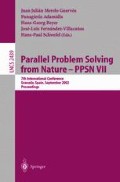Abstract
We propose a new genetic algorithm (GA) for job-shop scheduling problems (JSSP) based on the parameter-free GA (PfGA) and parallel distributed PfGA proposed by Sawai et al. The PfGA is not only simple and robust, but also does not need to set almost any genetic parameters in advance that need to be set in other GAs. The performance of PfGA is high for functional optimization problems of 5- or 10-dimensions, but its performance for combinatorial optimization problems, which search space is larger than the functional optimization, has not been investigated. We propose a new algorithm for JSSP based on an extended PfGA, extended to real-coded version. The GA uses random keys for representing permutation of jobs. Simulation results show that the proposed GA can attain high quality solutions for typical benchmark problems without parameter tuning.
Access this chapter
Tax calculation will be finalised at checkout
Purchases are for personal use only
Preview
Unable to display preview. Download preview PDF.
References
Bagchi S., Uckun, S., Miyabe, Y., Kawarnura, K.: Exploring Problem-Specific Recombination Operators for Job Shop Scheduling, International Conf. Genetic Algorithms (ICGA-91), pp.10–17, 1991.
Bean, J.C.: Genetics and random keys for sequencing and optimization, ORSA Journal of Computing, vol.6, no.2, pp.154–160, 1994.
Bierwirth, C., Mattfeld, D., and Kopfer, H.: On permutation representations for scheduling problems, Proc. of PPSN IV, pp.310–318, 1996.
Bierwirth, C. and Mattfeld, D.C.: Production scheduling and rescheduling with generic algorithms, Evolutionary Computation, vol.7, no.1, pp.1–17, 1999.
Bruns, R.: Direct chromosome representation and advanced genetic operations for production scheduling, International Conf. Genetic Algorithms (ICGA-93), pp.352–359, 1993.
Davis, L.: Job shop scheduling with genetic algorithms, International Conf. Genetic Algorithms (ICGA-85), pp.136–140, 1985.
Giffler, B. and Thompson, G., Algorithms for solving production scheduling problems, Operations Research, vol.8, pp.487–503, 1960.
Goldberg, D.E.: Genetic Algorithms in Search, Optimization, and Machine Learning, Addison Wesley, 1989.
Jain, A.S., and Meeran, S.: Deterministic job-shop scheduling: past, present and future, European Journal of Operational Research, vol.113, pp.390–434, 1999.
Kizu, S., Sawai, H., and Endo, H.: Parameter-free genetic algorithm: GA without setting genetic parameters, Proc. 1997 International Symposium on Nonlinear Theory and its Application, vol.2 of 2, pp.1273–1276, 1997.
Kobayashi, S., Ono, I., and Yamamura, M.: An efficient genetic algorithm for job shop scheduling problems, Proc. Sixth International Conference on Genetic Algorithms, pp.506–511, 1995.
Nakano, R. and Yamada, T.: Conventional genetic algorithm for job shop scheduling, Proc. 3rd International Conference on Genetic Algorithms, pp.474–479, 1991.
Norman, B. and Bean, J.C.: Random keys genetic algorithm for job shop scheduling, Engineering Design & Automation, vol.3, no.2, pp.145–156, 1997.
Sawai, H., Kizu, S.: Parameter-free genetic algorithm inspired by “disparity theory of evolution”, Proc. of PPSN V, pp.702–711, 1998.
Sawai, H., Kizu., S., and Endo, T.: Parameter-free genetic algorithm (PfGA), Trans. IEICE, Japan, vol.J81-D-II, no.2, pp.450–452, 1998 (in Japanese).
M. Snir, S.W. Otto, S Huss-Lederman, D.W. Walker, J. Dongarra: MPI: The Complete Reference, The MIT Press (1997)
Storer, R., Wu, S., and Vaccari, R.: New search spaces for sequencing problems with application to job shop scheduling, Management Science, vol.38, pp.1495–1509, 1992.
Vaessens, R.J.M.: Operations Research Library of Problems, Management School, Imperial College London, ftp://mscmga.ms.ic.ac.uk/pub/jobshop1.txt, 1996.
Vázquez, M. and Whitley, D.: A comparison of genetic algorithms for the static job shop scheduling problem, Proc. of PPSN VI, pp.303–312, 2000.
Yamada, T. and Nakano, R.: A genetic algorithm applicable to large-scale job-shop problems, Proc. PPSN II, pp.281–290, 1992.
Author information
Authors and Affiliations
Editor information
Editors and Affiliations
Rights and permissions
Copyright information
© 2002 Springer-Verlag Berlin Heidelberg
About this paper
Cite this paper
Matsui, S., Watanabe, I., Tokoro, Ki. (2002). Real-Coded Parameter-Free Genetic Algorithm for Job-Shop Scheduling Problems. In: Guervós, J.J.M., Adamidis, P., Beyer, HG., Schwefel, HP., Fernández-Villacañas, JL. (eds) Parallel Problem Solving from Nature — PPSN VII. PPSN 2002. Lecture Notes in Computer Science, vol 2439. Springer, Berlin, Heidelberg. https://doi.org/10.1007/3-540-45712-7_77
Download citation
DOI: https://doi.org/10.1007/3-540-45712-7_77
Published:
Publisher Name: Springer, Berlin, Heidelberg
Print ISBN: 978-3-540-44139-7
Online ISBN: 978-3-540-45712-1
eBook Packages: Springer Book Archive

